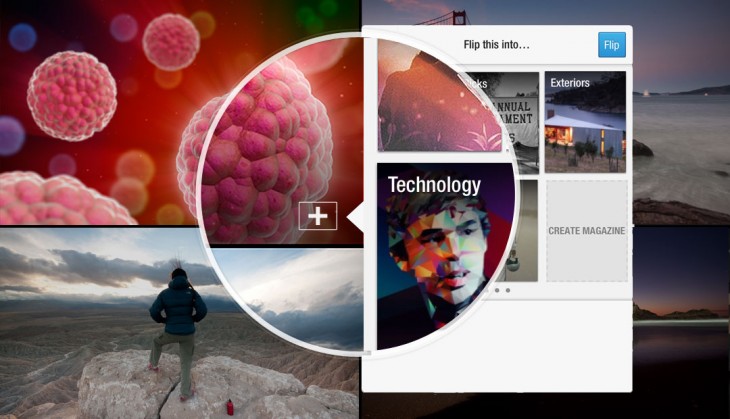
Flipboard has become a massively popular service in the past few years. Today, the company announced that it has 50 million readers, more than double the amount than in August, when it reported a 20 million reader figure.
In addition, it is also launching a new feature that allows anyone to curate and create their own in-app magazine, with major publishers already using the service. As an added bonus, version 2.0 of Flipboard now allows readers to also search based on hashtags and topics.
Meet Flipboard version 2.0
Flipboard calls the release its “most ambitious undertaking” to date. We spoke with Flipboard’s CTO Eric Feng (formerly the CTO of Hulu and a partner at venture capital firm Kleiner Perkins Caufield & Byers) who told TNW that while the service has typically been about feeds that Flipboard has created, it is moving in a direction whereby users can now create their own feed centered around topics, events, or simply personal interests.
Readers who create their own magazines can elect to have their creations viewed publicly by everyone or just by themselves. Content that can be curated include stories, videos, music, and photos. Flipboard says that for publishers, this new version is a fresh way to share archival content, publish great collections, or simply package stories together in a new way.
In a way, you might think of Flipboard almost like an improved, mobile-focused version of Delicious.
It starts with a tap of a button
When a reader wishes to create their own magazine, they can do it on two different ways — either directly from the application or from a Web browser. If done directly on the iOS app, the reader must tap on a plus button [+] located next to an existing article in Flipboard in order to begin — unfortunately the magazine cannot be created from scratch.
For those on the Web, the company has a bookmarklet that can be installed on the browser, which will help to add content to Flipboard. The behavior is similar to what one would expect with Pinterest. However, the magazine must still be viewed on the mobile device.
Flipboard says that:
Anything that inspires readers, from cooking to current events, can be the topic of a new magazine. Because magazines are public, they can grow an audience and others can like items, comment on posts, or even subscribe to other people’s magazines. When people interact a magazine, the curator learns about it through new Flipboard Notifications.
When a magazine is created, the reader can give the magazine a title, description, and select a relevant category to assign it to. Readers can continue to add content as they please to their creation. As of now, multiple editors/authors per magazine is not permitted, although Flipboard may roll this feature out in the future.
The order in which the stories appear depends on when they were first published. Currently, reordering stories is not possible, although Feng says that the company will eventually be releasing a re-ordering tool and will be available for select audiences. In the meantime, the only thing that’s possible is to change what appears is the reader’s magazine’s cover photo.
Holding true to being the digital magazine rack
With the demise of Google Reader, many people have been trying to find a suitable substitute to the service. Popular alternatives include Feedly, Zite, and of course Flipboard. With this new version of Flipboard, it’s important to note that self-created magazines will only curate specific articles, posts, or items, not whole sources. By this, we mean that readers cannot simply take the RSS feed of The Next Web and input that into their curated magazine (although we would love for that to happen).
Flipboard 2.0 is the next evolutionary step for the company to really create the digital magazine rack. What it appears that they’re trying to create is exactly what readers see when they’re at the airport and walk past a bookstore and try to pick out a magazine for their flight.
Everyone can create their own publication now — up to 144, in fact.
Better discovery
In addition to the self-creation service, Flipboard is also rolling out improved discovery tools. First of all, the Content Search feature has been updated. Located at the top of every page in the app, it allows readers to find anything shared on Flipboard, including magazines other readers have created. Not only can topics and keywords be searched, but also by #hashtag.
For example, a search for ”cycling” will instantly display pages of stories, videos and images being shared on cycling. If readers want to browse for more, they can select from a wide range of results coming from social networks, RSS or magazines.
Flipboard has also made a tweak to its app so that content shared from other social networks like Facebook and Twitter keep the conversation. When someone shares a post from Facebook or Twitter, in version 2.0, users are able to leave comments, share/retweet, or Like/favorite it. That information gets pushed back to the original source and doesn’t stay with Flipboard. Feng says that by doing so, it will allow Facebook, Twitter, Tumblr, and the like to grow their audience outside of the social networking space.
Magazines can also be shared across social networks with friends and family. For those who receive a link and view it on a desktop computer or a non-Flipboard supported device, unfortunately it will not be displayed. If viewed on a supported device and Flipboard isn’t installed, the company says the reader will be prompted to install the app.
Other updates include:
- A tap on the red ribbon opens a new visual Content Guide that gives readers a view into everything on their Flipboard – showing “My Magazines” as well as all of the content they subscribe to on Flipboard under “My Subscriptions.” This new view allows readers to rearrange or delete sections by tapping and holding or quickly switch between section of interest.
- New side bars in magazines surface related magazines and sub-sections of content so it’s easy to find more interesting sources and topics.
- New recommended reading suggestions appear throughout Flipboard. For example, in Cover Stories the “More for You” module gives readers an easy way to explore a variety of content related to their interests.
Etsy becomes one of the first self-curating publishers
In one of it’s “one more thing” moments, Flipboard has also announced that it has partnered with Etsy to bring its blog and product lines to the service. According to the company, the publication was designed specifically for Flipboard (it taps into Etsy’s API) and is also integrated right with Etsy’s shopping cart so that no only can readers view the latest products, but also tap to buy easily.
Other content partners that it has include the Rolling Stones, who created a magazine centered around The Beatles that was made from archived content. The idea was to help create a narrative about the British group and includes various forms of content, including audio files.
Moving away from simple consumption to more curation
The new version of Flipboard is available starting today for iOS devices. For those with Android-based smartphones, readers can only view magazines, and not create them.
Feng says that the company is moving away from being about consumption to more about curation and creation. The idea is that magazines are a powerful way to tell a narrative and Flipboard believes that it has found a powerful way to make that happen.
Main header image: rick
Photo credit: Flipboard, Ken Hawkins/Flickr
Disclosure: This article contains an affiliate link. While we only ever write about products we think deserve to be on the pages of our site, The Next Web may earn a small commission if you click through and buy the product in question. For more information, please see our Terms of Service.
Get the TNW newsletter
Get the most important tech news in your inbox each week.







